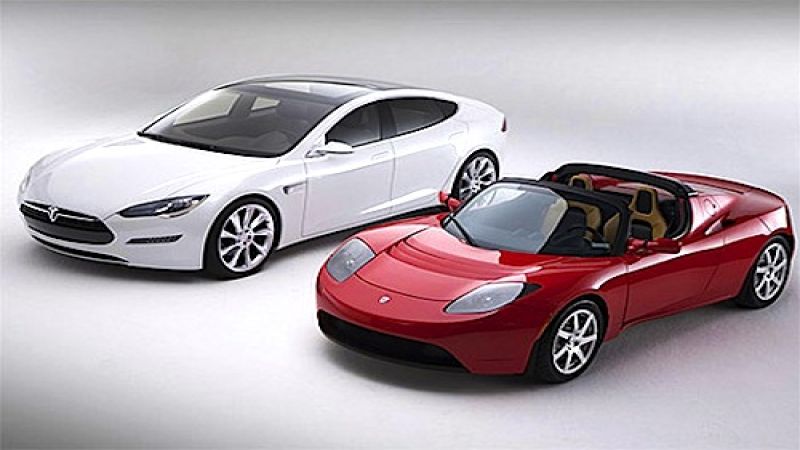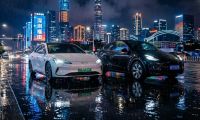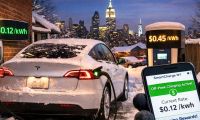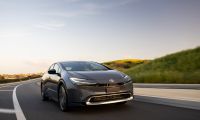It’s hard to fathom why anyone would bash freedom of choice when it comes to cars. How anti-patriotic! Fox Business and a few others still don’t understand the socio-economics behind electric vehicles. It’s all about choice and last we checked, freedom of choice plays a big part in our society, or at least used to.
The Fox Bashing Routine. OK, so Fox isn’t the most objective and impartial news outlet, something it exemplifies on a daily basis. It published an article on how electric cars are heading yet again into a dead end, shows how little Fox Business understands electric vehicles, EV. Note the heavy-handed title: “Insight: Electric cars head toward another dead end” (http://www.foxbusiness.com/news/2013/02/04/insight-electric-cars-head-toward-another-dead-end/) and its opening paragraph: “Recent moves by Japan's two largest automakers suggest that the electric car, after more than 100 years of development and several brief revivals, still is not ready for prime time - and may never be.”
If you want serious news about electric vehicles, mainstream media and its three owners is the last place to go for impartial and educated coverage, that much we know. In the many car events we attend, mainstream journalists often time exemplify themselves with a complete lack of understanding in the questions they ask. This Fox Business piece confirms it. Yes the electric car has been around for over 100 years but has had little to no “development”, at least compared to the billion of dollars poured annually into various internal combustion engine technology, gasoline carmakers and petroleum companies.
Introducing Hydrogen Again. If the appeal of an electric drive doesn’t compute for Fox, another far more complex and further down the road technology does, the recently much hyped hydrogen car. Following last week’s comeback of hydrogen news, Fox adds: “the attention of automotive executives in Asia, Europe and North America is beginning to swing toward an unusual but promising new alternate power source: hydrogen.” If you follow electric technology, whether battery or hydrogen, you know both are electric vehicles and overall are good for the industry. You also know carmakers have never stopped developing alternatives to battery operated vehicles. Maybe Fox Business just missed it.
Of course gasoline cars have come a long way these past few years with fuel efficiency, so why does Fox Business bash electric vehicles that ultimately give us more freedom of choice? In a strangely anti-patriotic move, it dismisses entrepreneurs and startups in America but OKs more expensive technologies down the road. We all mainstream journalists are under incredible stress to grab attention and revert to cheap gizmos, such as sensationalist headlines, but this logic goes beyond any reasonable argument.
Good specialized articles are hard to find in mainstream news and the continual impartial bashing of one technology only shows how so-called professional journalists lacks understanding and impartiality. Yes, the electric car has been around for a long time but had it enjoyed the billions spent on gasoline engines over a century, we would have a lot more choice today. Sorry Fox Business, “insights” in this specialized field is something you show lacking. It’s too bad mainstream news portrays electric vehicles in an impartial ways and knocks down what makes our country strong, starts up and innovations.
Set Torque News as Preferred Source on Google











Comments
Professing untruth as the
Permalink
Professing untruth as the truth for pay is not journalism, but rather sophistry.
Is it going to far to suggest FOX may have a hidden agenda within its reporting?
Rupert Murdoch would apparently do most anything to increase influence and profit.
If Fox is promoting Hydrogen, you can be sure it is because they are beholden to the corporations who stand to profit from selling it in a manipulated market.
After all, it's not easy to gain a percentage of the sun and the wind.
Hi Don, yes, that's the white
Permalink
In reply to Professing untruth as the by Don Bain
Hi Don, yes, that's the white elephant in the room and Fox has always been anti-pure electric vehicles, favoring gasoline and their derivatives, hydrogen included. Hydrogen is a good technology but is has a lot of obstacles to overcome before being practical. Pure electric cars are much closer to meeting our needs, expected or real.
The same could have been said about MSNBC and CNN. The problem is when 3 corporations hod 95% of the so-called news outlets, you have an ethical dilemma and sophistry is a good way to explain the current state of news.
I think I'm gonna keep your line: "After all, it's not easy to gain a percentage of the sun and the wind." Man in his folly knows no bounds.
Nail. Head. Good aim.
Permalink
In reply to Hi Don, yes, that's the white by Nicolas Zart
Nail. Head. Good aim.
I'm gonna bet G.W. Bush owns
Permalink
I'm gonna bet G.W. Bush owns a nice portion of their stock!
Sounds like pump and dump. Although, Hydrogen refracted (???) from methane might be viable.
Yes, hydrogen has its place
Permalink
In reply to I'm gonna bet G.W. Bush owns by Joe Eckstein (not verified)
Yes, hydrogen has its place in the automotive industry but it is very much down the road. This just highlights again how mainstream media is not well educated and is sad considering how many they reach. Most people don't understand much about EV, even less about hydrogen cars but they will walk away feeling they do with no real substance.
I have no time for Fox, and
Permalink
I have no time for Fox, and generally agree with your sentiment - but cannot fully agree while EV's are subsidized - I'm all for freedom of choice, but not if someone else is picking up part of the tab.
EVs are subsidized, as well
Permalink
In reply to I have no time for Fox, and by Anonymous (not verified)
EVs are subsidized, as well as petroleum companies, gasoline at the pump, so in essence it's all on a somewhat equal footing, although more goes to petroleum. It's not a very clear cut situation, I agree.
I would buy an EV if it could
Permalink
I would buy an EV if it could get me where I needed to go. But they can't. The range problem is not a simple gamble of suddenly discovering dramatically superior battery technology. Development butted up against fundamental physics barriers long ago. What we have seen in the last ten years is only incremental improvement, much of it economically ridiculous on a well-to-wheels basis -- overly complex, wasteful, short-lived peak amp retention, potentially dangerous -- that falls far short of what consumers demand. The battery EV segment was given a heavenly chance to prove itself with tremendous government incentives over the past 4 years. They failed miserably. The best solution they could present to consumers was an option to buy two cars, an EV for local travel and an ICE for range at a total cost equivalent to 3 ICE vehicles. No wonder hybrids dominate! But most puzzling is the EV true believers' stance against refuelable batteries. Refuelable batteries are the obvious solution to the range problem but mention hydrogen to this crowd and they start gnashing their teeth! Hydrogen makes more sense every day with rising petroleum prices, plentiful natural gas and rapidly expanding renewable infrastructure. The political decision that ditched fuel cells in favor of ancient battery tech was very costly in terms of dollars and the loss of momentum in US fuel cell development. Luckily, the rest of the world was not focused on the "quick fix" falsely promised by US policy, guided by an amateur executive and an idiot savant nuclear physicist, and continued the development of hydrogen vehicles, many as hybrids incorporating lightweight and cheap supercapacitors instead of "advanced" batteries. Like Winston Churchill said, " Americans usually get it right after they try everything else."
I'm not sure the premise of
Permalink
In reply to I would buy an EV if it could by Anonymous (not verified)
I'm not sure the premise of your argument is valid. 80% of our daily commute is 40 miles or less, something all EVs can accommodate. Not too many of us drive 300 miles a day to get to work. The problem is that consumers don't really know what they want, they are being told what they need. A big difference. The biggest problem is consumers believe that for that 1% to 20 of the time their driving distance is greater than 40 miles, they would need a car with more range. All you have to do these days is rent or use a car sharing service which is cheaper in terms of cost ownership and insurance.
When we look back at the slow pace of development and efficiency of the gasoline motor over a century, what battery technology has done in 6 years is nothing more than astonishing. Think about it, a start up offers a car that rivals others in its price bracket with a 260 mile range (something most M3 or M5 have anyway) with nothing more than common laptop batteries. I don't see that as failing, even less "miserably".
Hybrids dominate for now but plug-in hybrids will challenge that notion the next few years. Your average American family owns more than one car which makes the whole EV for local driving and PHEV for longer distances a no-brainer. Refuelable batteries, or hydrogen makes sense but it has a lot of obstacles to deal with compared to what pure battery vehicles offer now, without getting into how much more they will tomorrow. I don't see where you find that "rapidly expanding renewable infrastructure" when talking about hydrogen. Hydrogen cannot have an transportation or storage infrastructure as of yet. Maybe you mean alternative energy systems such as solar, hydro and wind? In that case, yes.
I can assure not too many people talk about hydrogen in Europe and having lived in Japan, hydrogen is a futuristic concept to all. In both places they talk more about battery, which might be "ancient" as you mention, but certain offer the most potential the quickest. One thing we can agree is yes, politics always drag down the debate on both side, they are equally inapt to make business and technical decisions.
I'm not going to comment on
Permalink
I'm not going to comment on news outlets, since as far as I'm concerned, there isn't a mainstream news source that is reliable or even close to objective. But I will comment on power sources.
I envision a future wherein manufacturers build cars that aren't dependent on power trains. The fuel source(s) we're using will be regional. The U.S. is a big place and has a lot of resources, none of which are consistently available at every point on the map.
Using my favorite punching bag, the Volt, as an example, this would work like this: where I live, natural gas and oil are easy to get, so a Volt powered by diesel-electric, NG-electric or H2 fuel cell would be ideal. In So Cal, the Volt with a larger battery pack and no engine (aka BEV) or with a smaller engine and larger battery would be great. In Florida, the same. In the Northeast, fuel cells or diesel-electric would be great. So GM builds one Volt with multiple power train options, each available and sold regionally or nationally as they see fit. This all assumes another option, like zinc-air, doesn't appear.
We're starting to see this paradigm already. Hybrid versions of regular cars and now BEV versions of regular vehicles are showing up. Flex-fuel versions of common cars are seen here all the time.
I imagine a future where powertrains are flexible and not necessarily a huge selling point for the car itself and where very few vehicles (probably mostly sports cars and luxury units) are sold with only one option available.
In other words, fuel-wise, there will be a lot more eggs in our basket than there are now.
That's exactly what we need,
Permalink
In reply to I'm not going to comment on by Aaron Turpen
That's exactly what we need, regional solutions and get away from this Washington DC dictates everything while the rest tries to get back to work. Hopefully, at some point people will take matter into their own hands and either build, convert or customize their cars to make use of the most efficient energy they have.